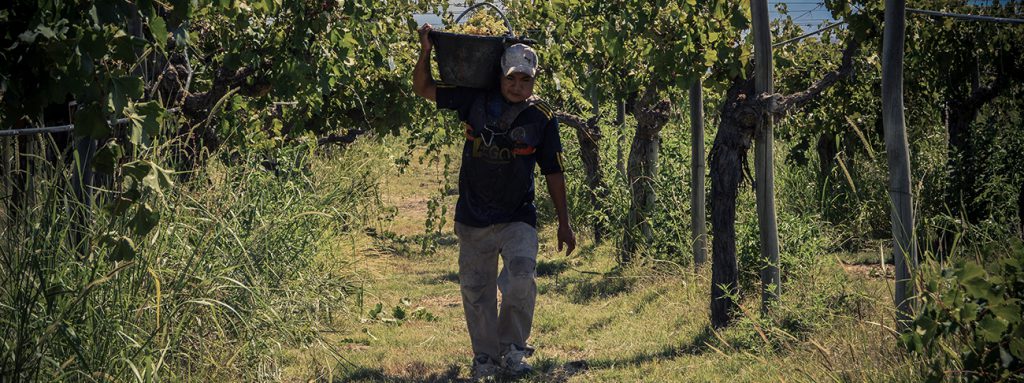La Riojana is a co-operative of small-scale grape farmers in northwest Argentina who also process, bottle and export their wine to Europe and the US.
Background and structure
The origins of La Riojana go back to the 1940s when Italian migrants to Argentina planted vineyards and formed a co-operative to produce and market their wine.
Today, descendants of those pioneers are among the 408 members of La Riojana who grow grapes on nearly 2,400 hectares. Individual vineyards are 5.8 hectares on average and employ a total of 250 workers. The grapes are harvested and transported to the co-operative’s wineries which employ more than 450 field, processing and office staff.
The main winery and vineyards are located in Argentina’s picturesque and remote Famatina Valley within the agriculturally rich province of La Rioja. With its rich alluvial soil and high altitude the valley is ideal for viticulture, the vineyards benefiting from warm, sunny days, cool nights and very low rainfall.
La Riojana provides its members with a number of services including:
guaranteed purchase of grapes at higher prices; transport from vineyard to winery; access to credit; free technical assistance; bulk purchase of diesel and fertilisers; profit sharing; and sports club and recreational activities.
Production and sales
La Riojana produces around 50 million bottles (4 million cases) of wine a year, of which nearly 12 per cent is certified organic. Over 20 per cent of the wine is exported – among the 20 importing countries, the main markets are Europe, the US, Brazil and Canada.
La Riojana produces a wide range of Fairtrade and organic certified wines from many different grape varieties. Its brands include Tilimuqui, Santa Florentina, La Posada, Raza Argentina, Solombra and Ecologica. It also supplies private label wines to leading retailers, including The Co-operatives range of seven Fairtrade Argentinean wines.
Fairtrade
La Riojana was Fairtrade certified in 2006. Fairtrade standards include a minimum price for grapes to cover average costs of sustainable production and an additional Fairtrade Premium to invest in business and community projects.
Fairtrade Premium projects
Members meet to discuss and decide how to invest the Fairtrade Premium and an elected committee is responsible for implementing and managing the selected projects. So far, the group has focussed on using the Premium to improve healthcare and education facilities in the rural communities where many of the growers, workers and their families live.
Health
The small, isolated village of Tilimuqui is located about 10km from the main winery and is home to many of La Riojana’s workers and their families. Fairtrade Premiums and grants from The Co-operative have funded a water facility with a well, electric pump and storage tanks that supplies residents with clean drinking water. Previously, water supply was erratic and sometimes unavailable which, with summer temperatures as high as 45ºC, created desperate conditions affecting villagers’ hygiene, health and education.
Education
A brand new secondary school was inaugurated in Tilimuqui in 2010, built by the Premium , with additional funding from The Co-operative and a Swedish importer. Before this, the remoteness of the village and cost of transport to the nearest secondary schools meant village children’s education ended at the age of 14. The hugely popular school has seen student numbers increase, and the school is planning to build more classrooms. The school specialises in agricultural studies and has a partnership with the local University of Chilecito which provides teaching staff and day-to-day management, enabling the school to offer a very high standard of education. The school project gives children the opportunity to become skilled agriculturalists and introduce new progressive farming methods to the co-operative and will also create new generations of young professionals whose skills and knowledge will help boost the local economy.
Other Premium projects:
- Purchase of a minibus for Tilimuqui secondary school; provision of free school equipment for workers’ children; donation of books and computer equipment to local schools.
- Provision of computer labs in three communities, including equipment, maintenance and free IT courses for children and adults.
- Donation of medical books and medical equipment (blood pressure monitors, audiometer to test newborn and infant hearing) to Chilecito Hospital.
- Donation of free medicines to First Aid centres in two villages.
- Micro-credit loan scheme for La Riojana workers.
- Development of a sports and recreation centre for workers and their families, particularly to keep young people from becoming involved in drug and alcohol abuse.
- Campaigns to teach local communities to care for their environment, including a reforestation project.
